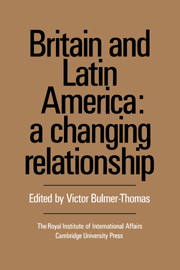Book contents
- Frontmatter
- Contents
- List of contributors
- Preface
- 1 Britain and Latin America in historical perspective
- Part I Cultural and political relations
- Part II Economic relations
- 6 Trade, aid and investment since 1950
- 7 Financial relations between Britain and Latin America
- 8 Britain and Latin America: oil and minerals
- Part III Sources of friction
- Part IV Conclusions
- Index
8 - Britain and Latin America: oil and minerals
Published online by Cambridge University Press: 02 December 2009
- Frontmatter
- Contents
- List of contributors
- Preface
- 1 Britain and Latin America in historical perspective
- Part I Cultural and political relations
- Part II Economic relations
- 6 Trade, aid and investment since 1950
- 7 Financial relations between Britain and Latin America
- 8 Britain and Latin America: oil and minerals
- Part III Sources of friction
- Part IV Conclusions
- Index
Summary
‘Latin America is the region of the future’, goes the old joke, ‘and always will be.’ A similar idea is contained in the old description of Peru (or Bolivia or at other times even Mexico) as ‘a beggar sitting on a throne of gold’. Latin America is almost the living proof of the proposition that resource wealth does not necessarily produce economic wealth. Meanwhile, at the same level of semi-caricature, Britain is in many ways a society which has lost interest in the Third World, focusing politically on NATO and Europe and commercially on ‘sunrise’ industries and financial services rather than ‘metal bashing’. Inner cities count for more in official thinking than ex-colonies and ex-colonies for more than other parts of the Third World.
This relative lack of interest may change considerably in the medium term. As for the present, quantification of British interest is difficult. Figures on British oil and mineral imports from Latin America are set out below (see Table 8.1); they were, of course, compiled at a time of low prices for most minerals. Direct foreign investment figures are not readily available, but the picture is probably also one of slow increase from a very low base.
The history
Although Latin America in terms of minerals has rarely been as central to British concerns as the Middle East and Southern Africa, there have been important connections. During the Second World War, Venezuelan oil supplies to Britain were vital. During the First World War Mexican oil, if not perhaps quite so crucial, was still of great importance; Mexican oil also provided the basis of the Cowdray fortune.
- Type
- Chapter
- Information
- Britain and Latin AmericaA Changing Relationship, pp. 136 - 148Publisher: Cambridge University PressPrint publication year: 1989



